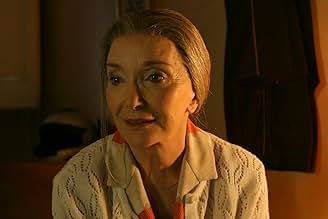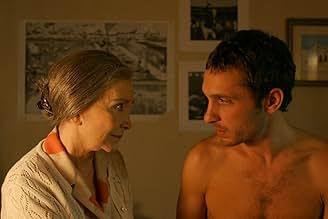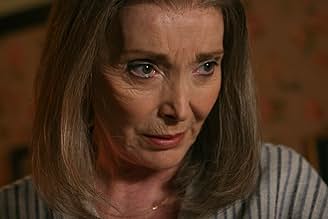Ajouter une intrigue dans votre langue6 characters--contemporary archetypes of urban solitude--in an old Barcelona building: an old husband and wife, her sister, and 3 tenants: a teacher of French, a young ex-footballer, now sec... Tout lire6 characters--contemporary archetypes of urban solitude--in an old Barcelona building: an old husband and wife, her sister, and 3 tenants: a teacher of French, a young ex-footballer, now security guard, and a pregnant Latin American girl.6 characters--contemporary archetypes of urban solitude--in an old Barcelona building: an old husband and wife, her sister, and 3 tenants: a teacher of French, a young ex-footballer, now security guard, and a pregnant Latin American girl.
- Prix
- 2 victoires et 9 nominations au total
Histoire
Le saviez-vous
- Bandes originalesCant del Barça
(uncredited)
Music by Manuel Valls Gorina
Lyrics by Josep Maria Espinàs and Jaume Picas
Performed by Pablo Derqui
Commentaire en vedette
"People only really talk when they're about to die, and it's not usually very interesting," says Lola (Rosa Maria Sarda), an elegant French teacher and one of the tenants Ramon (Josep Maria Pou) asks to leave the rooms he's rented out to them for years. Lola expresses the assumption of this film, which focuses on Ramon and his wife as they review their lives and talk to the departing tenants. Ramon, who looks like Tom Wilkinson on a bad day, has cancer and hasn't long to live. The couple think they want to be alone for his last days. And yes, eventually they do really talk, and some of it isn't very interesting; but some is.
Pons has produced a provocative, well-acted little study, but it could as well be a play (it is adapted from one) and might have benefited from some more opening up. And this is true despite sepia illustrative clips that constantly interrupt the conversations. The director ought to have used these with more restraint. If somebody says "we once did such-and-such," she feels compelled to introduce a clip showing such-and-such being done--every time. Rather than liven things up, these sometimes frenetic and unnecessary two-second interruptions very often do little but emphasize the slowness of the main proceedings, and the drumbeats and loud clicks that introduce and conclude them become grating as time goes on. Unlike Bergman's ''Saraband, to which this has been compared, there is not much suspense in Barcelona (a Map) about what is going to happen. Conversations between landlords and tenants may not be the easiest way of delving deep into lives to begin with, and at first most of what emerges about Ramon and his wife Rose (Nuria Espert) indeed seem to be things they haven't, rather than have, done. This is true even when they talk to each other, and also when Rosa talks to her gay brother Santi (Jordi Bosch), about whom we learn only that he's a surgeon who cruises the baths.
However, Rosa and her little failed footballer and security guard David (Pablo Derqui), the second tenant conversation, do get kind of personal. Abandoned by his wife, David wants Rosa to be his mother. And he's naked when first seen and nearly naked during the interview. Pons seems to like showing naked men. And before the film is over, gender lines have been crossed and broken taboos have been revealed.
Ramon's smiles show he likes talking to the pregnant restaurant cook Violeta (Maria Botto, an actress from Argentina), who speaks Spanish (the rest is in Catalan). This is the third tenant conversation; and it turns out they actually have a surprisingly intimate relationship; this dialogue is even more personal, to the point of straining credulity. But nonetheless Violeta is the most alive person and the screen lights up with her presence and her beauty.
Of course the old couple have secrets--parenthood even he wasn't aware of in the case of Ramon, and a diary Rosa wants to reveal to Santi containing a revelation from their past. The final, most dramatic revelation, a gratuitous shocker, strains credulity even further and seems more like a desperate last-minute grasping for drama than anything that follows logically and organically from the material. (It's the kind of bombshell that works better on stage than on screen.) On top of that, as a denouement Ramon reveals to Rosa for the first time that he's a kind of male witch. With these attention-grabbers, what might have become a subtle study of old age is undercut by grotesque plot-line twists.
Pons is no amateur and the production though low keyed is stylish; the interiors are atmospheric; the cast is admirable. Nonetheless, the result is only for the patient and the credulous. The hothouse atmosphere gives you the feeling you get sitting indoors all day when it's nice outside.
Finally, in light of the overall theatricality, the basic premise begins to feel a bit dubious. It provides a pretext for long chats. But why should Ramon and Rosa be turning out these lodgers? How are they a bother? Isn't the rent needed? We learn in fact that when Ramon dies, Rosa will be forced to resort to trickery to collect her late husband's whole pension. Perhaps Ramon and Rosa should be talking to a geriatric counselor rather than trading last-minute revelations with each other and with departing lodgers.
Pons has produced a provocative, well-acted little study, but it could as well be a play (it is adapted from one) and might have benefited from some more opening up. And this is true despite sepia illustrative clips that constantly interrupt the conversations. The director ought to have used these with more restraint. If somebody says "we once did such-and-such," she feels compelled to introduce a clip showing such-and-such being done--every time. Rather than liven things up, these sometimes frenetic and unnecessary two-second interruptions very often do little but emphasize the slowness of the main proceedings, and the drumbeats and loud clicks that introduce and conclude them become grating as time goes on. Unlike Bergman's ''Saraband, to which this has been compared, there is not much suspense in Barcelona (a Map) about what is going to happen. Conversations between landlords and tenants may not be the easiest way of delving deep into lives to begin with, and at first most of what emerges about Ramon and his wife Rose (Nuria Espert) indeed seem to be things they haven't, rather than have, done. This is true even when they talk to each other, and also when Rosa talks to her gay brother Santi (Jordi Bosch), about whom we learn only that he's a surgeon who cruises the baths.
However, Rosa and her little failed footballer and security guard David (Pablo Derqui), the second tenant conversation, do get kind of personal. Abandoned by his wife, David wants Rosa to be his mother. And he's naked when first seen and nearly naked during the interview. Pons seems to like showing naked men. And before the film is over, gender lines have been crossed and broken taboos have been revealed.
Ramon's smiles show he likes talking to the pregnant restaurant cook Violeta (Maria Botto, an actress from Argentina), who speaks Spanish (the rest is in Catalan). This is the third tenant conversation; and it turns out they actually have a surprisingly intimate relationship; this dialogue is even more personal, to the point of straining credulity. But nonetheless Violeta is the most alive person and the screen lights up with her presence and her beauty.
Of course the old couple have secrets--parenthood even he wasn't aware of in the case of Ramon, and a diary Rosa wants to reveal to Santi containing a revelation from their past. The final, most dramatic revelation, a gratuitous shocker, strains credulity even further and seems more like a desperate last-minute grasping for drama than anything that follows logically and organically from the material. (It's the kind of bombshell that works better on stage than on screen.) On top of that, as a denouement Ramon reveals to Rosa for the first time that he's a kind of male witch. With these attention-grabbers, what might have become a subtle study of old age is undercut by grotesque plot-line twists.
Pons is no amateur and the production though low keyed is stylish; the interiors are atmospheric; the cast is admirable. Nonetheless, the result is only for the patient and the credulous. The hothouse atmosphere gives you the feeling you get sitting indoors all day when it's nice outside.
Finally, in light of the overall theatricality, the basic premise begins to feel a bit dubious. It provides a pretext for long chats. But why should Ramon and Rosa be turning out these lodgers? How are they a bother? Isn't the rent needed? We learn in fact that when Ramon dies, Rosa will be forced to resort to trickery to collect her late husband's whole pension. Perhaps Ramon and Rosa should be talking to a geriatric counselor rather than trading last-minute revelations with each other and with departing lodgers.
- Chris Knipp
- 26 avr. 2008
- Lien permanent
Meilleurs choix
Connectez-vous pour évaluer et surveiller les recommandations personnalisées
Détails
- Date de sortie
- Pays d’origine
- Langues
- Aussi connu sous le nom de
- Barcelona (A Map)
- Lieux de tournage
- sociétés de production
- Consultez plus de crédits d'entreprise sur IMDbPro
Box-office
- Brut – à l'échelle mondiale
- 182 030 $ US
- Durée1 heure 30 minutes
- Couleur
- Mixage
Contribuer à cette page
Suggérer une modification ou ajouter du contenu manquant

Lacune principale
By what name was Barcelona (un mapa) (2007) officially released in India in English?
Répondre









